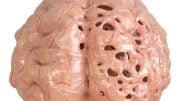
A genetic link between Alzheimer’s Disease and gut disorders has been discovered. Credit: Edith Cowan University
The groundbreaking research that established the connection between Alzheimer’s Disease and gut health may enable earlier diagnosis and new treatment options.
People who have digestive problems may be at a higher risk of acquiring Alzheimer’s disease (AD). The connection between the two has been verified by a groundbreaking Edith Cowan University (ECU) study, which might also enable early identification and new treatment options.
The most common kind of dementia, AD deprives people of their memory and ability to think. Over 82 million people are anticipated to be affected by it by 2030, costing US$2 trillion, and there are no known cures. It has been hypothesized in prior observational studies that there is a link between AD and gastrointestinal disorders, but until recently, the mechanisms behind these connections have remained unclear.
The Centre for Precision Health at ECU has recently added to our understanding of these relationships by confirming a genetic link between AD and several gut disorders. The research analyzed large genetic data sets from AD and other gut-disorder studies, each including roughly 400,000 participants.
The study’s lead researcher, Dr. Emmanuel Adewuyi, said it was the first comprehensive examination of the genetic connection between AD and several gut disorders. The researchers found that individuals with AD and gut disorders share genes, which is significant for a number of reasons.
“The study provides a novel insight into the genetics behind the observed co-occurrence of AD and gut disorders,” Dr. Adewuyi said.
“This improves our understanding of the causes of these conditions and identifies new targets to investigate to potentially detect the disease earlier and develop new treatments for both types of conditions.”
Centre for Precision Health director and study supervisor Professor Simon Laws said whilst the study didn’t conclude gut disorders cause AD or vice versa, the results are immensely valuable.
“These findings provide further evidence to support the concept of the ‘gut-brain’ axis, a two-way link between the brain’s cognitive and emotional centers, and the functioning of the intestines,” Professor Laws said.
Is cholesterol a key?
When researchers conducted further analysis into the shared genetics, they found other important links between AD and gut disorders – such as the role cholesterol may play.
Dr. Adewuyi said abnormal levels of cholesterol were shown to be a risk for both AD and gut disorders.
“Looking at the genetic and biological characteristics common to AD and these gut disorders suggests a strong role for lipids metabolism, the immune system, and cholesterol-lowering medications,” he said.
“Whilst further study is needed into the shared mechanisms between the conditions, there is evidence high cholesterol can transfer into the central nervous system, resulting in abnormal cholesterol metabolism in the brain.
“There is also evidence suggesting abnormal blood lipids may be caused or made worse by gut bacteria (H.pylori), all of which support the potential roles of abnormal lipids in AD and gut disorders.
“For example, elevated cholesterol in the brain has been linked to brain degeneration and subsequent cognitive impairment.”
Hope for the future
The cholesterol link could prove vital in treating AD in the future.
While there are currently no known curative treatments, the study’s findings suggest cholesterol-lowering medications (statins) could be therapeutically beneficial in treating both AD and gut disorders.
“Evidence indicates statins have properties which help reduce inflammation, modulate immunity, and protect the gut,” Dr. Adewuyi said.
However, he said there was a need for more studies and patients needed to be assessed individually to judge whether they would benefit from statin use. The research also indicated diet could play a part in treating and preventing AD and gut disorders.
Reference: “A large-scale genome-wide cross-trait analysis reveals shared genetic architecture between Alzheimer’s disease and gastrointestinal tract disorders” by Emmanuel O. Adewuyi, Eleanor K. O’Brien, Dale R. Nyholt, Tenielle Porter and Simon M. Laws, 18 July 2022, Communications Biology.
DOI: 10.1038/s42003-022-03607-2
The study was funded by the National Health and Medical Research Council.









A very recent paper shows that just small amounts rapamycin for a short time improved gut health in fruit flies and mice for life. If people took this in their 20s or 30s, it might prevent many gut disorders, and perhaps Alzheimer’s.
It would probably take a decade or more to see this effect, if they started the tests very soon.
Cholesterol lowered by statins may not do the same thing as cholesterol lowered by exercise. Exercise has already been shown to be a potent Alzheimer’s preventative. I would think that if statins worked as well at preventing Alzheimer’s, we would already know. Sauna, though, may be as effective as exercise in lowering cholesterol in the same way as exercise…elevated heart rate, and increased circulation. But it, too, needs more research.